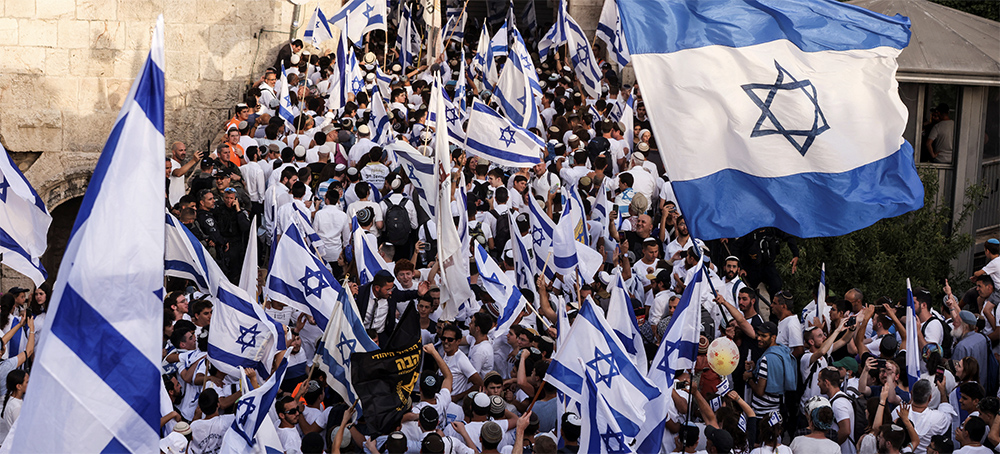Jerusalem Flag March: Israeli Nationalists Stream Through Muslim Quarter
Raffi Berg BBC News East Jerusalem. (photo: Al Jazeera)
30 May 22
East Jerusalem. (photo: Al Jazeera)
30 May 22
Thousands of flag-waving Israelis have marched through Muslim areas of East Jerusalem's Old City in an event seen as highly provocative by Palestinians.
The march celebrates Israel's capture of East Jerusalem in the 1967 war.
Israel regards the whole of Jerusalem as its capital, something rejected by most countries and the Palestinians.
The Palestinians claim Israeli-occupied East Jerusalem as the capital of a future state of their own - ruled out by Israel - and political displays by either side are viewed by the other as direct challenges.
The BBC's Yolande Knell said the scene was raucous by the Damascus Gate entrance of the Old City, as young Israelis chanted and danced, carrying flags and playing drums as they headed towards the Muslim Quarter.
They shouted out: "The people of Israel live!"
Some Jewish Israeli families were among the crowd, carrying pushchairs down the narrow steps. There was a heavy presence of Israeli police, some with dogs guarding over the proceedings, she said.
But in this space where there would be usually large numbers of Palestinians going about their business or sitting on the stairs at that time of day there were only a handful of Palestinian journalists, our correspondent added.
Earlier, there were violent confrontations between Palestinians and Israeli police at a flashpoint holy site in the Old City. Shortly after, hundreds of Jewish visitors, including a far-right MP, ascended the hilltop site, where some danced, waved Israeli flags and bowed down to pray, before being stopped by police. Palestinians view such actions as incendiary and militant groups had warned they would not tolerate it.
"Israel is irresponsibly and recklessly playing with fire by allowing settlers to desecrate the holy sites" in East Jerusalem, the president's spokesman Nabil Abu Rudeineh said, according to the official Palestinian news agency Wafa. Palestinian officials often describe Israelis who visit the holy site revered by Muslims and Jews as settlers and their presence there as a desecration.
Jews and other non-Muslims are allowed to visit the site at certain times but are forbidden to pray or display any religious or national symbols under a long-standing agreement with the Muslim authority which administers the compound.
The site is known to Muslims as Haram al-Sharif (Noble Sanctuary), and contains the al-Aqsa (Qibli) mosque, the third holiest place in Islam. It is also known to Jews as the Temple Mount and is the holiest place in Judaism.
One Palestinian Jerusalemite activist, Usama Barham, told the BBC that "what happened this morning inside our holy mosque [at the site] was much more dangerous than the Flag March".
Last year, a devastating 11-day conflict between Israel and Palestinian militants in Gaza erupted on Jerusalem Day when Gaza's Hamas rulers fired rockets towards the city after Israeli police and Palestinians clashed at the holy site.
The Flag March takes place on Israel's Jerusalem Day and has proceeded through Damascus Gate every year apart from 2021, when authorities rerouted it because of the volatile situation.
"We came to show that Israel is ours and we're never giving up our city," participant Eitan Englander said. "We are happy to be here. We don't come to fight. We come to show our pride in our country."
The march ended at the Jewish holy site of the Western Wall, which abuts the al-Aqsa mosque compound.
This year's march took place amid an already highly charged atmosphere between Israelis and Palestinians.
A wave of deadly attacks on Israelis by Palestinians or Israeli Arabs, and the deaths of dozens of Palestinians, including attackers, militants and civilians, by Israeli forces has fuelled anger on both sides.
It also follows recriminations over the killing of Al Jazeera Palestinian-American reporter Shireen Abu Aqla, shot dead while reporting on an Israeli military operation in the occupied West Bank on 11 May.



